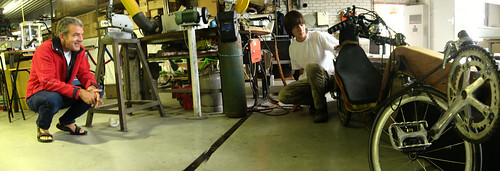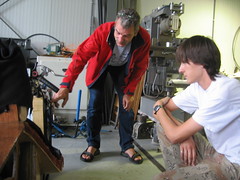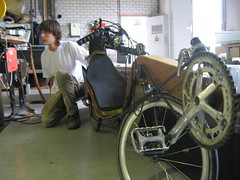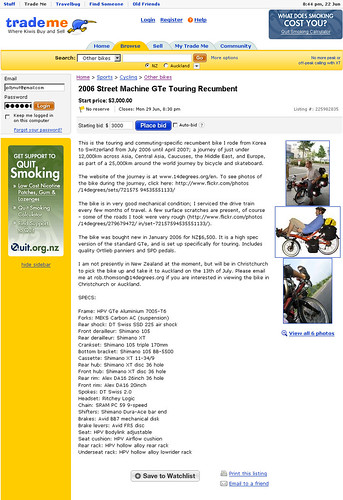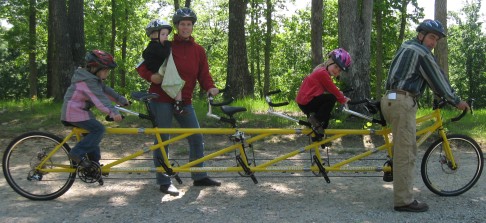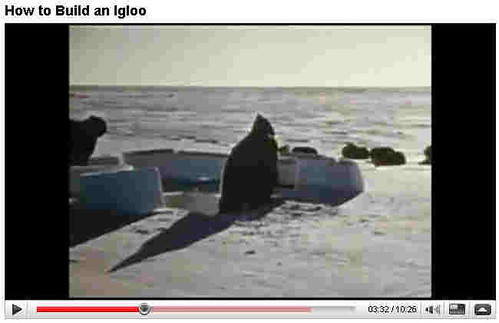This post is probably going to be heavy going for many readers. Not quite the ‘check out this awesome high pass that I just cycled across’ post that is so easy to skim over, just checking out the photos. No, this post is another existential, metaphysical pondering post. And to be honest, if you make it to the end of this post, you’re a legend. It is more for my records than anything esle.
Continue if you dare…
The more I spend here back home in New Zealand, the more I am able to reflect on the way I view the world. I am still to a very large extent finding each day rather surreal. Feeling quite detatched from my surroundings. I do not feel as though I have returned home. Rather, I have returned to the country where my family lives, and where many of my friends live. My parents house is not my home. It is where my parents live. I still feel like I am ‘in-between’. Still a ‘stranger’ in this environment (not only my parents’ home, but this city, the social groups etc).
I’m not at all concerned with this fact.
This is part of reverse culture shock.
When I think about it, it is actually great fun.
Being unsettled is unnerving, but at the same time I feel invigorated by the opportunity to explore my mind.
The only thing that bothers me, is the fact that most ‘normal’ people probably find me altogether mad and rather frustrating.
I do apologise, and I hope you will understand.
In any case, Wim Harwig, an great man I met and had the honour of staying with in The Netherlands (http://14degrees.org/en/?p=383) recently shared a link with me. It was a link to an interview of Counselling Psychologist Jill Mytton by Richard Dawkins. Mytton made the majority of her remarks about religion based on her experiences with the religious sect (cult?) that is the Exclusive Bretheren. Therefore I had to take the remarks with a grain of salt, considering the extreme cult-like attributes of this very exclusive religion. However, I found the interview to be thoroughly fascinating, with much of what was said resonating with me. It gave me much to consider and explore as I face a year of biblical theology training at Laidlaw College.
These days, whenever I am reading an interesting book or watching a poignat interview, I will type out quotes that resonate with me or so something to make me ponder. I did this with the interview with Jill Mytton, and here’s what I found to be particularly poignat…
Now before we begin, I realise that I am stepping out on a limb here. It may be that in a year’s time I will look back on these things that I felt moved to type out, and think, “What was I thinking?!”. But that’s probably just the religious Rob being cautious. The Rob who cycled and skateboarded around the world feels justified (as all humans should) to ask questions of this world he lives in. Hopefully God won’t mind.
Click on the image below to watch the interview in its entirety. My comments on various parts of the discussion are below in italics…
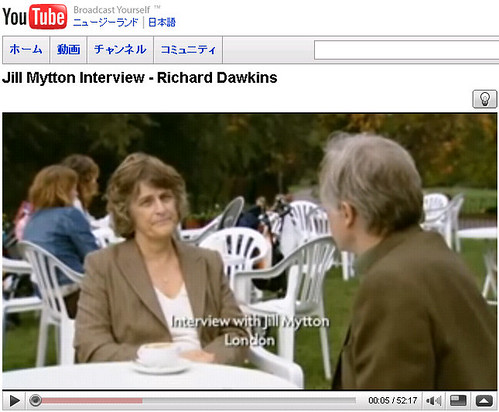
At 28:22
Mytton: My research again showed that if people were attending church regularly, they were actually experiencing less mental stress than people that weren’t. So there was a protective function to it. It didn’t depend on whether they believed it or not, it depended on their actualy attendance, which suggests it is the social group that is important; the network, the structure that it provides.
Rob: This is something that I have wondered ever since getting back to New Zealand and attending church services. How much of church culture is actually just something to give us identity, whether we actually resonate with the central message of Christ or not?
At 28:55
Dawkins: You mentioned earlier that religion can be healthy. Can you explain that?
Mytton: Religion can provide an explanation for people and provide an interpretive framework about why the world exists, where it came from, all the kind of existential questions that people ask.
Dawkins: From a psychological point of view, does it matter if that’s true, the explanation that they get?
Mytton: No. So long as the person is satisfied with it. If they believe in it, and a lot of people don’t even need evidence. They can have this faith in something, and it provides them with something with a structure, with a way of life, and with a belief system, that they are OK with, as long as they don’t start asking questions. And of course once they start doing that, then the whole edifice can crumble. It can also provide other things, I mean, the whole ritual of a religion provides a means by which you can express emotion for example. It helps you get through critical events in life like death, and in that sense it can offer hope, because most religions offer the idea of an after-life, or reincarnation for example. The whole process of prayer, I believe, has a lot of similarities to therapy. When you are praying, you are talking to somebody. That “person” is listening, or you believe he is listening. And it is a he. Ad the whole process of talking through something helps us to cognitively process whatever it is that is troubling us. So you’re having a relationship with some supernatural being. And it does actually help you work through some of your things that are troubling you.
At 31:07 about prayer
Mytton: As long as you believe. I mean, the point about God is, about the supernatural being, is that the people believe he does exist. So when they are talking to him in prayer, or even when walking down the street…they can ask for advice, they can ask him to help them make choices and decisions about life, and there’s somebody listening. And that’s what I do as a therapist; I listen. And that is the most valuable thing you can do for a human being is to listen. Of course I don’t only listen, I’m actually answering as well, or I am talking with them.
Rob: I found this section about prayer very interesting indeed. Just the other day I was mulling this out aloud with a cousin, wondering about what, if any, psychological research there was into the reasons people pray. I mean, for those who don’t believe in God, there surely must be an explanation for why people would spend so much time praying. This is an interesting take on it. I wondered to myself, “Can I name a specific time when I can categorically claim that a prayer was answered? That is, was there a time where there was no doubt that had God not intervened, that something would or would not have happened?” The answer for me is of course no. At no time in my life can I say categorically that “God did for absolute certain answer my prayers”.
At 31:50
Mytton: (Religion is) consoling, it can be comforting. The problem is of course, is when you have all that, it’s very easy to get sucked into something that is more pathogenic. A bit more further down towards the other end of the continum. And that’s the danger.
At 32:58
Mytton: (Being ‘born again’) is a strange phenomena.
At 33:32
Evangelism…
Dawkins: It’s notorious, for the first week of a freshman’s arriving at university, they are descended upon by the Christian this and the Christian that and the Christian the other, and they don’t leave them alone.
Mytton: …(the students) are vulnerable, and it’s perhaps the first time they have been away from home, so they haven’t got that structure behind them anymore.
Dawkins: And they’re offered friendship…
Mytton: Love-bombing, as it is called, offered a lot of things they have perhaps been deprived of in the past.
At 34:05
Dawkins: And coming back to the people doing the lovebombing, do you think they really believe in what they are promoting?
Mytton: That’s a good question. It’s the million-dollar question, really. I think a lot of them do really believe in it….and it does make it all the more dangerous. I think maybe the people at the top, some of them don’t believe in it. They’ve built this kind of empire almost, and they are the earthly god sitting at the top, and they are the only ones that are in touch with the supernatural god sometimes. You know, everything is a conduit through them; the man of god.
Rob: While this might be the case in many cults, it is not so in the faithful-to-the-text message of Christ (and how do you actually determine that – read the Bible yourself); that is the priesthood of all believers. Mind you, I did see this in a certain extent at the church in Hita City (Japan); the pastor being the top of the pile; the ultimate teacher who had to oversee everything.
At 34:41
Mytton: The whole euphoria that comes with born-again Christians, I mean we know about the, that the brain produces its own natural opiates, the endorphines, and I think that there is a physiological background to all of this as well. I mean rituals, there is a link between rituals and prayer and meditation and intense religious experiences and the production of endorphines…all the church singing is improving the people’s sense of well-being.
Rob: I saw this often in church, and I believe that I was caught up in this at one stage, and now wonder about my emotional reaction to hearing ‘praise and worship’ songs. Am I feeling emotion because of a true understanding of the ‘Person of God’ or just because I have associations in the past that connect Christian ‘praise and worship’ songs with an emotional sense of wellbeing simply because of the melody etc? Since I have not read the entire Bible for myself yet, I am sure that I do not understand fully the nature of the God that I claim to believe in. So perhaps it is the latter…
At 36:20
On the downside to religion (as opposed to the health benefits previously stated)…
Mytton: What I would call the more unhealthy type of religion for a start tends to diminish the self, diminish the identity of the person. So instead of the person being valued for their strengths and their potential, they’re seen as wicked, sinners, shapen in iniquity as I said earlier, and even when they do do good works, it’s not really them who is doing it; it is God working through them. So there’s this sense of helplessness really; there’s nothing that I can do to save myself. And sin is not seen as something that is inevitible, which perhaps is a more positive way of looking at it, but sin is seen as something that is to be judged, and that forgiveness is extremely difficult and shame and guilt and fear, everything is controlled by those three emotions. So if you transgress you feel shame, you feel guilt, you feel fear because of the consequences of that. There is a tendency for unhealthy religions to have a very absoluteist way of thinking about things. So everything is seen as either or. Either you’re a sinner or you’re saved. They think it’s either truth or it’s not truth. There’s absolutely no room for ambiguity or uncertainty in the middle, and life isn’t actually like that. Life is not in all or nothing. There is this huge area in the middle, where most of us live.
Rob: There is something about this statement that really rings true. I’m not sure what to think of it all.
At 43:30
Mytton: Unhealthy religion would not encourage children to ask questions.
Rob: Mytton discussed the need for children to be able to develop their own path. Children in most Christian families, when they ask ‘How did the world come about?’ will still be told ‘God made it’. Why are they not told that nobody knows for absolute certainty. We can only make preliminary conclusions based on scientific evidence, so even that is not an absolute certainty. The bible tells us that God had a lot to do with it. But does God exist? Well I think so. Why do I think so? Because something must have started it all.
Mytton talks about the need for people to think for themselves. I agree. We learn from our mistakes. But on the other hand, when one looks at human history as a whole, it appears that actually, you know what, we don’t. We don’t learn from our mistakes. There is a dysfunction that it seems we have not been able to shake, despite more than 5,000 years of humanity. There are still wars. There is more slavery today than every before. There is something wrong with us. We do need to ask why this is, and how can we cure it?
At 44:16
Mytton: Billy Graham said one thing once; “why do you all you’re gonna understand God? God is such of a higher being; why should you possibly even think you could understand him. You’re just have to accept and have faith.” And I thought ah yes, that’s the answer. And for a while, my spirit was quieted for a while, but it didn’t last for very long. I think the problem with many of these religions, is that they don’t allow children to ask questions; that naturally inquiring mind of a child is suppressed. And that is very detrimental because they never see any other prespective, they never see any other perspective. They don’t learn to criticise, they don’t learn to evaluate what they are hearing. They just have to blindly accept it, really. And that kind of religion is unhealthy.
At 45:32
Mytton: Religion is absolute…it tends to say this is the truth, and there is no other truth; this is it.
At 45:43
Mytton: If you don’t believe what they are saying to you, then somehow that is a shortcoming in you; it’s turned around. It’s you who has lost your faith. It’s not religion that’s wrong, it’s not the truth that’s wrong, or something is wrong with what they’re saying to you, it’s you. Somehow it’s a shortcoming in yourself. And again, you’re made to feel guilty for not believing in it totally.
Rob: Oh so true. Cultural understanding is based on questions. On observing, on accepting…
At 46:35
Speaking about Exclusive Brethren…
Mytton: Anything that is outside is evil and wicked and it mustn’t be heard and it mustn’t be listened to. And so discussion with the outside world is discouraged. Information coming in is very much controlled.
Rob: While this was said regarding Exclusive Bretheren, I can’t help but feel that honest questioning and consideration of truth outside of the Bible is somewhat suppressed in much of Western Evangelical Christian culture. That’s why I liked reading Donald Miller’s books so much. He is honest about his questions and worries about Christian culture. Honesty and transparency, and permission to voice what one is thinking or struggling with has to be present in all cultures, ways of life.
![]() His name is David Wielemaker.”
His name is David Wielemaker.”





